Coming In Hot
The second part of this episode comes in with a few rapid scene changes.
First, an apparently empty suite of rooms at court where Fictional Misselden comes in looking kind of resplendent in peach satin, even if the fit is not quite what it was in her yellow gown. If you haven’t got the subtext she’s happy to walk straight in and actually literally play with fire for a bit. 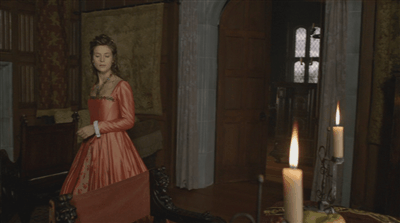 Francis ‘Multi tasker’ Bryan spies her from a concealed position, to the point where you wonder if she is, in fact, expecting him to be there. But it’s fine, she’s responding to a note he left her.
Francis ‘Multi tasker’ Bryan spies her from a concealed position, to the point where you wonder if she is, in fact, expecting him to be there. But it’s fine, she’s responding to a note he left her.
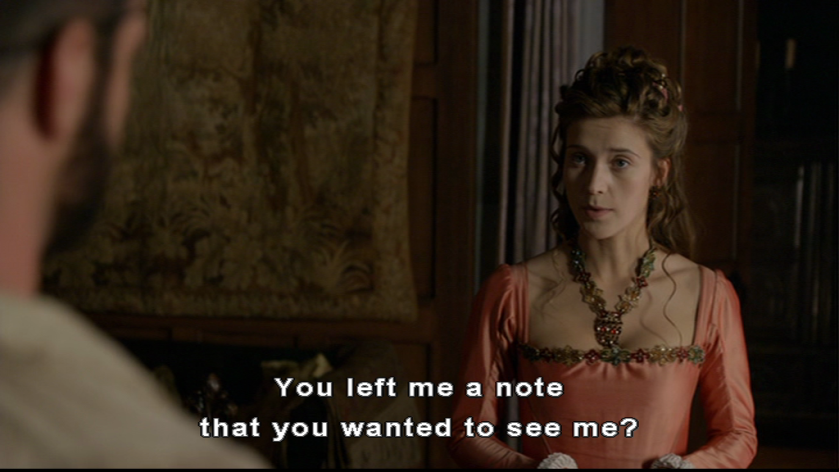
And, Oh, they both know what they are doing here. The annunciation could not be more clipped, the glances could not be more lingeringering, and for a guy that will turn out to be a complete heel later on (and made a pretty good stab at it earlier), Sir Francis makes an entirely reasonable case to Ursula, when she reminds him of the existence of her fiancé. 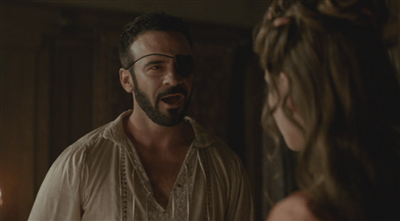 We leave Fictional Misselden to ponder, and we go to a slightly younger woman with a very different quandary.
We leave Fictional Misselden to ponder, and we go to a slightly younger woman with a very different quandary.
A Matter of Life and Death
The Actual Historical Princess Mary held out against the threats made towards herself until the interrogations and arrests of her allies started. So Actually historically, the bending of the will of Mary Tudor took a lot more pressure than shown in The Tudors. After the threats at her home from that group of councillors, Cromwell wrote her a sharp letter, basically in her Father’s voice, demanding obedience and then he started arresting or interrogating members of her faction1. At this point Queen Jane is reported to have tried intervention, which used to be so effective for Anne, but was ‘rudely repulsed’q.
Mary and Chapuys wrote to each other in this instance, rather than spoke face to face, but The Tudors is going to make Chapuys her father figure as much as their relative social status allows, so it’s a personal conversation here. His advice follows the historical report2, but is perhaps a little more honest about the Emperor’s intentions than the Actual Historical Chapuys.
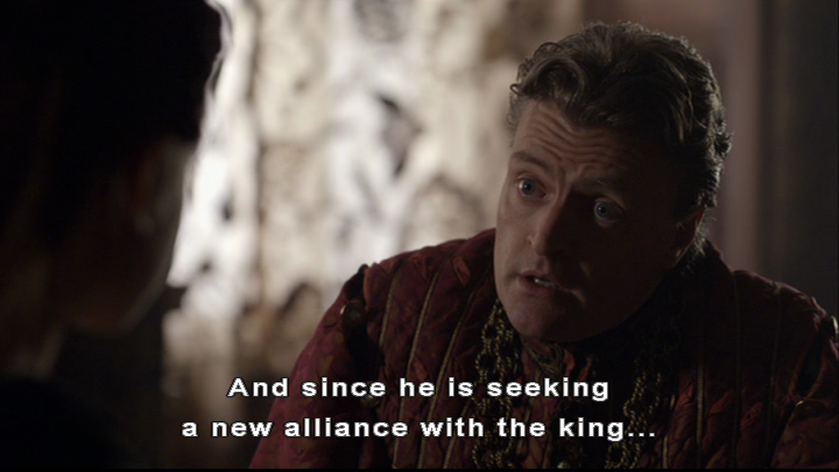
Henry and Cromwell were pretty deft with their handling of Mary’s allies. It wasn’t just that people were carried away by the possibilities of change, but Cromwell was talking to Chapuys first like Mary’s restoration was a done deal, and then like it was a done deal if she just signed the letter. Henry made no promises, or acknowledged any, leaving himself room for the sudden reversal. Chapuys’ instructions from the Emperor3, where they touched on Mary, were all about securing her marriage and that the heir acknowledgement was desirable if they could get it, but not vital, because she was really Henry’s only viable heir right now, and because no one thought Mary was about to run into serious problems. When it happened it was all very sudden, and Chapuys had to give the best advice he could on spec.
In the event, Chapuys gave her the advice shown here and other points on a similar theme. 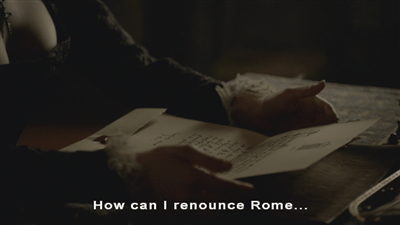 He gave her practical advice to behave pragmatically, to do what she had to do to save her life. That was the advice of the Catholic Church anyway, if threatened with physical violence or death for your faith, then if you do not feel a personal call to martyrdom, capitulate and God will understand. You may need to repent and make contrition for the act you were forced to do, but the Church accepted that it was being forced upon you. It wasn’t enough for Mary who held her religion, like many of her contemporaries, in simple and absolute terms and agonized about this decision.
He gave her practical advice to behave pragmatically, to do what she had to do to save her life. That was the advice of the Catholic Church anyway, if threatened with physical violence or death for your faith, then if you do not feel a personal call to martyrdom, capitulate and God will understand. You may need to repent and make contrition for the act you were forced to do, but the Church accepted that it was being forced upon you. It wasn’t enough for Mary who held her religion, like many of her contemporaries, in simple and absolute terms and agonized about this decision.
Her decision to capitulate under this terrible pressure was a profound wound to her conscience. Perhaps an equivalent of what we might feel on our modern consciences would be deliberate harm against an innocent person or animal. This is where this would have been on her moral compass, something deeply painful, an absolute wrong she has done, and a regret that she will carry with her for some considerable time.
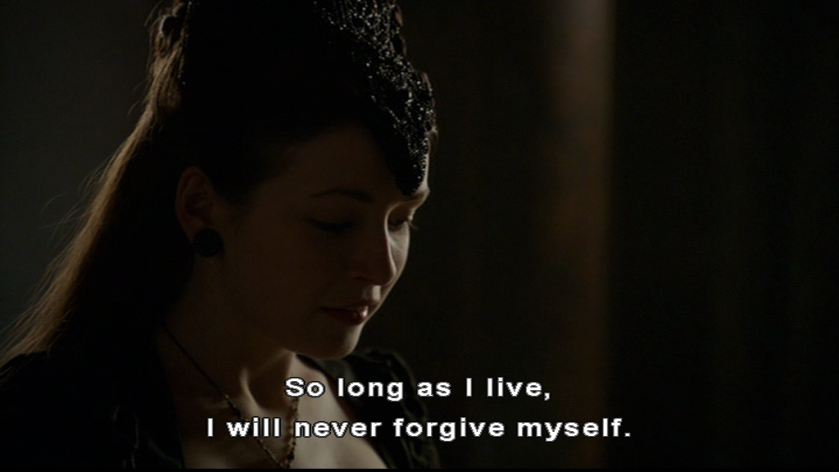
And where do we go but to one of the future partners of her labours, Reginald Pole.
Holy Pole
First, check out the Pope’s summer residence.
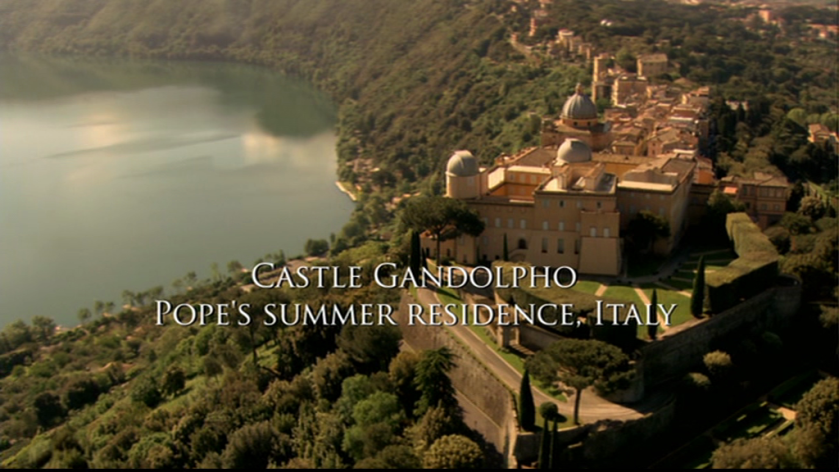
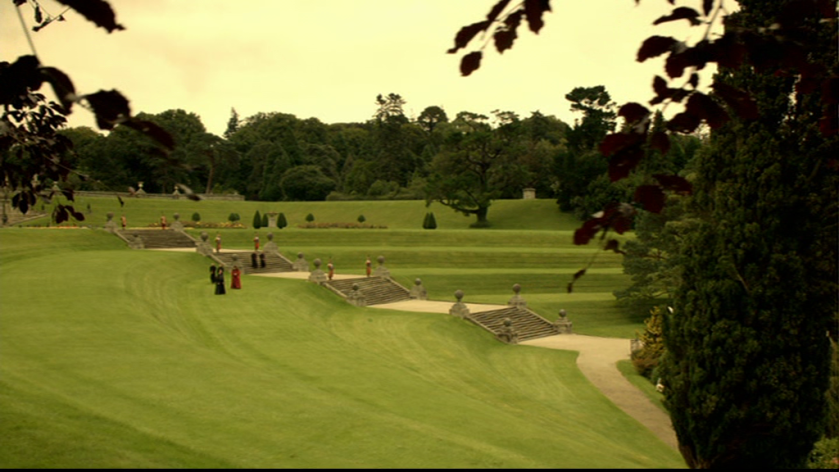
Reginald is approached by a Cardinal with an awful lot of star wattage.
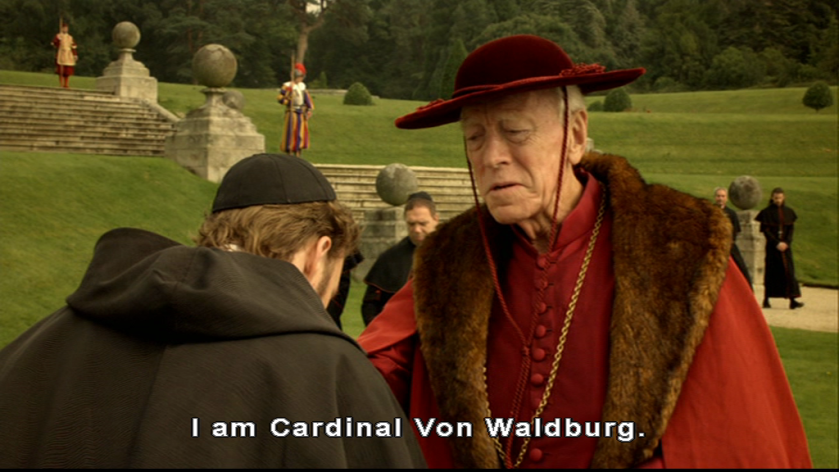
He’s probably supposed to be this guy. I mean the Wikipedia article claims it, but, how can I put this? If he is supposed to be Cardinal Otto Truchsess Von Waldberg, then Max Von Sydow is not here to play good old Otto, Otto has been summoned so Max Von Sydow can be our Vatican plotting big hitter this year. Otto Truchsess Von Waldburg was 14 years younger than Reginald Pole. Otto just finished puberty and is worrying about Protestantism somewhere in Germany right now, maybe considering becoming a priest some day.
So, Cardinal Von Sydow Von Waldburg it shall be.
Cardinal Von Sydow Von Waldburg and the far more Actually Historically promising Father Reginald Pole commiserate over the state of England but it’s really just foreplay to reveal young Father Pole’s secret identity. Mark Hildreth, playing Reginald Pole might have been bricking it filming that day, but he turns in a nice performance of one of those very smart men that’s just a little bit too earnest to be reliable. 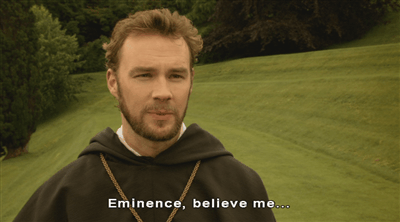 And of course Von Sydow has fun with his custom build Cardinal. He swings it a little wide, but the material demands some zazz. He even carries the light zoom.
And of course Von Sydow has fun with his custom build Cardinal. He swings it a little wide, but the material demands some zazz. He even carries the light zoom.
So who was Reginald Pole? Well, it was quite a walk to get to it, but he did have a claim to the throne.
It’s based in the Yorkist claims to the throne of Edward IV, The Duke of Clarence and Richard III, three brothers that killed a lot. That’s the opposite side to Henry VII who won the last round of the Wars of the Roses against Richard III and ended them. But that wasn’t the only claim his son, our Henry VIII, had to the throne.
When Richard III had his nephews killed (Hey, he doesn’t have to pull the trigger if you know what I mean and he was in control of the Tower that he had forcibly imprisoned them in), English law of the time would accept that Elizabeth of York, Edward IV’s eldest daughter was the ‘Best Yorkist’ claimant. She never tested the claim by trying to become a Queen Regnant, the times were nowhere near ripe for that step. Instead she became Henry VII’s Queen Consort and Henry VIII’s mother, so she passed that ‘Best Yorkist’ claim right on to him.
But, if you also accepted Richard III’s assertions that Edward IV’s marriage to Queen Elizabeth Woodville was invalid then that could just vault your claim past all 5 daughters Edward IV had still living when he died, and their subsequent offspring to land at the Duke of Clarence’s line, and Clarence was Reginald Pole’s grandfather. Reginald had brothers, too.
So he had a claim but far from close one, still, a very useful guy to have around for any Pope. And the fact that he was in a religious order wasn’t really a bar. These things could always be put aside, if the good of nations suddenly became at stake.
Pole’s Gone
Back at court, and Ursula put out and got the necklace,

and now Francis is erupting in poetry.
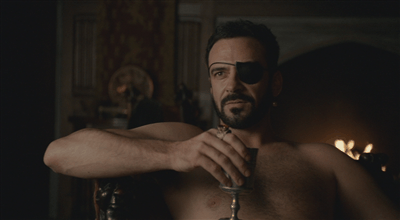
Three Great Men sit in a Room; A King, a Priest and a Rich man
Our languorous courtly asses are whipped to Yorkshire, where the good honest harvest of grass is coming in. 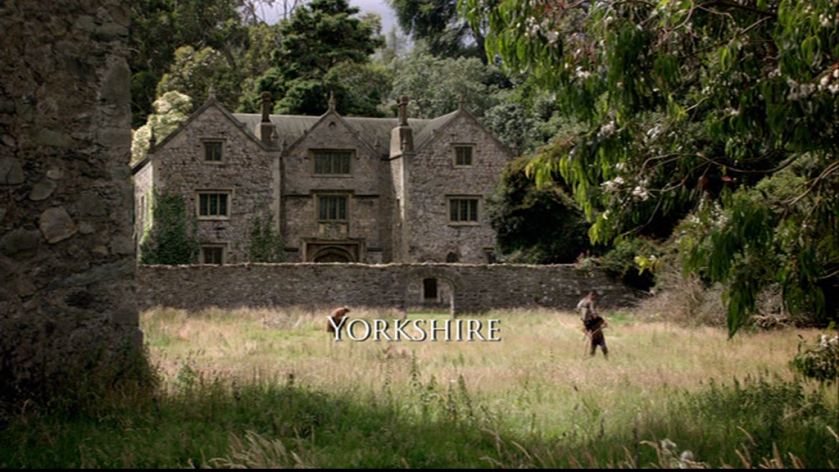 And as the score rises to religious heights, a man considers a call to action while we hear sounds of happy domesticity, of children and a meal being prepared in the next room.
And as the score rises to religious heights, a man considers a call to action while we hear sounds of happy domesticity, of children and a meal being prepared in the next room. 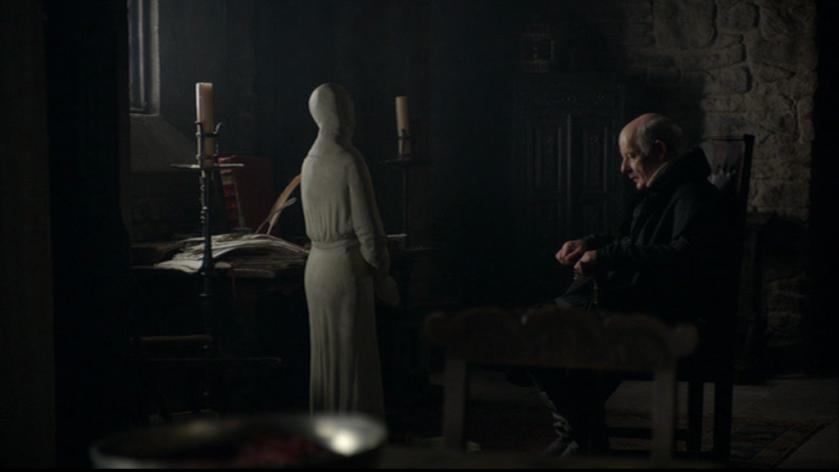
And the desecrated statue (someone brought it all the way to his house, apparently) from Sawley Abbey…
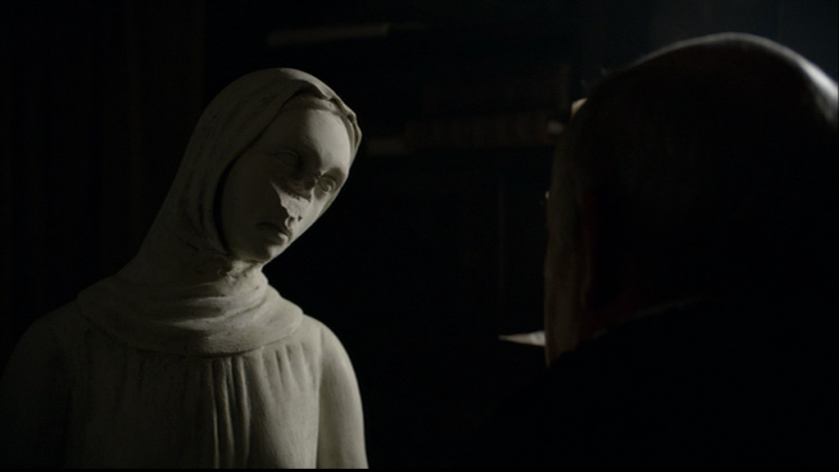
Is just all too damn much. This is not how the rebellion started. Robert Aske didn’t get a call to sombre religious adventure while sat in his good parlour chair and then everyone called a meeting and it happened. Also, lets say this once more and done – he was mid thirties, monocular and didn’t have a wife or children. OK, I feel better.
Robert Aske, as Geoffery Moorhouse says, is one of those peculiar people in History of whom we know only the very basic facts until 9 months in 1536-7 when suddenly it is possible to know what he did every day, sometimes by the hour.
Robert Aske and three of his nephews were part of a party traveling South to London from Yorkshire that set out on Wednesday 4th October 1536 5. People would often travel in associated parties, there was safety in numbers, and a lot of people wanted to get to London for the start of the law term. Early in their journey they were met by the local rebel leadership and asked to take an oath. They all took it, as it was not in itself particularly rebellious.
Their travel stops tell the rest of it. They tried to go South at first, then heard that some of their associated travelers had been detained ahead of them, so then they turned for home, to find that way blocked by more rebels, finally returning to the town they had stayed in the previous night, Sawcliffe5.
In the early hours this local firestorm of rebellion finally found them when rebels arrived in Sawcliffe and demanded that the men of Aske’s party go with them. Aske first negotiated free passage for his nephews, and then went to a muster at nearby Hambolton Hill where he spoke and essentially, joined up5.
It’s worth noticing that, despite what The Tudors would tell you, the Pilgrimage of Grace was not started by its Great Historical Leader. The Pilgrimage of Grace picked up its Great Historical Leader some distance along the way.
A Different Kind of Jackass
The letter from Elizabeth’s governess is Actual Historical6, but Henry’s reaction and the resolution to the problem is not.
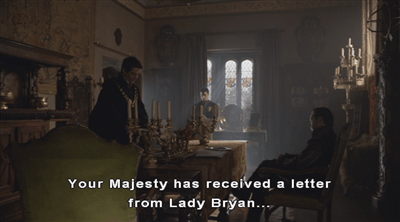
This is another piece of kindness that is going to get attributed to Queen Jane, but there’s no reason to think that this was Henry’s reaction or that anyone else paid. Elizabeth is first noted to be at Court near the beginning of the rebellion when she and Mary got brought in for security as much as anything else. And while everyone was far more interested in Mary, it was noted that Henry was affectionate towards Elizabeth7. He also never publicly questioned Elizabeth’s paternity8 and the charges framed against her mother never did go near the period of her conception.
Meanwhile, Mary, the daughter he had been a complete heel to has capitulated, which is excellent news. 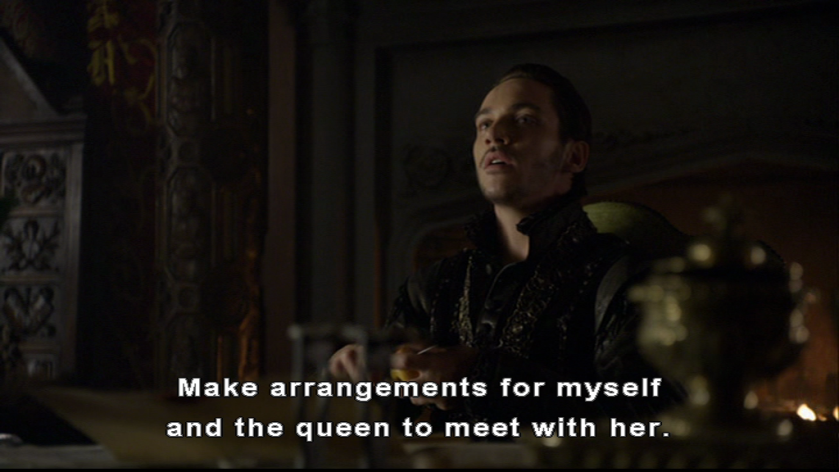
Having made efforts to stop being a problem, Henry’s unacknowledged heiress presumptive is about to bask in royal favour for a while. Henry also mentions the plague rumours that will be the first thing to prevent Queen Jane’s coronation.
Last, Cromwell gets the somewhat unusual news that Rich has done a run around him to get Cromwell more credit. Rich made sure Henry saw the figures and Henry is very pleased.
We go briefly to the pleasant fiction that maybe Queen Jane pawned her wedding necklace to get Elizabeth some decent clothes.
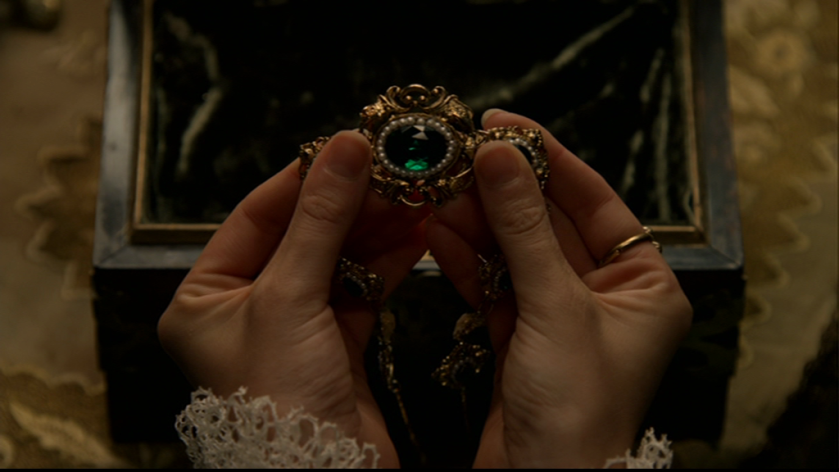
And then she gets to give Lady Rochford her mission statement.
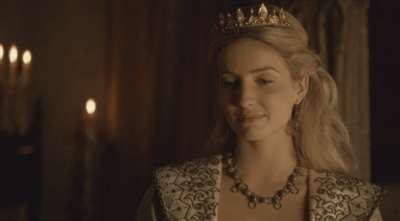
So the notion of Queen Jane’s kindness gets a bit of a general charitable twist for modern audiences and Jane gets to cement those good intentions with action.
Between them stands a Common Sellsword
Now, to the backdrop of a pounding soundtrack, punctuated by angelic singing, the Pilgrimage of Grace gets its stuff together and would like to convince you, like a common influencer, that it has not been up for ten hours already.
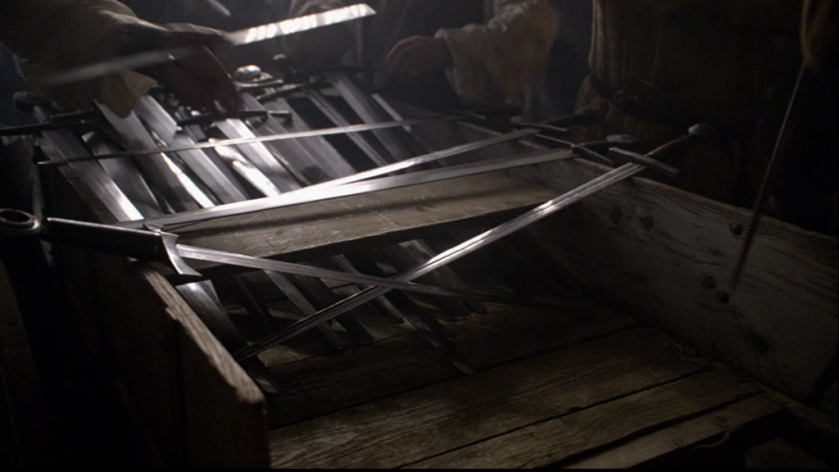
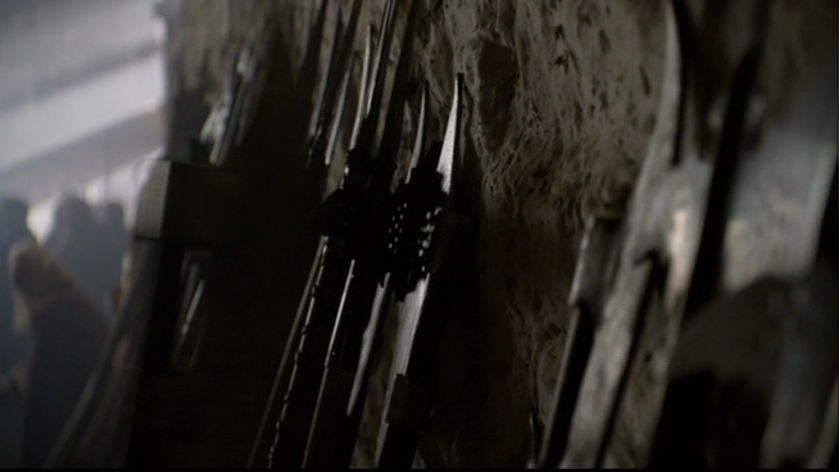
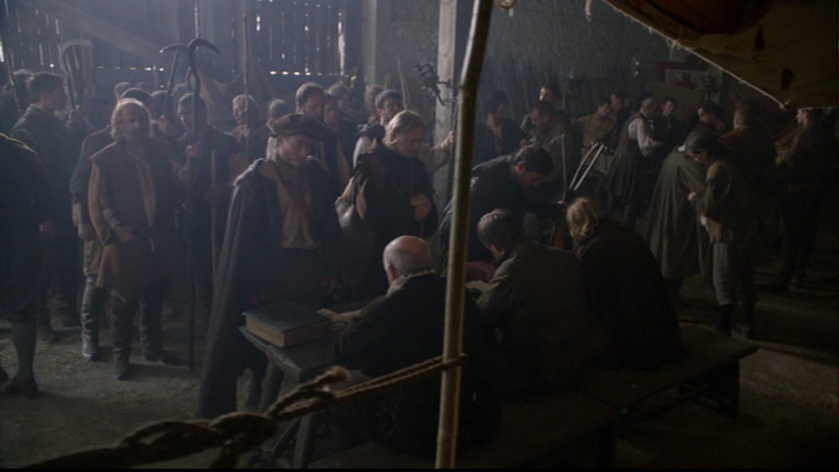
We’ve moved on from the beginning of the rebellion, and its initial, rapid spread, when the recruitment experience wasn’t so much ‘decide to volunteer, in the day, form an orderly queue’ as ‘get taken from your house and made to swear an oath in the street, probably at night while shit scared and surrounded by armed men’.
So, the scene we get here is far more mid-rebellion than early rebellion, which was generally far more dangerous and chaotic. Here, Aske is fully involved, it only started getting called the ‘Pilgrimage’ once the Lincolnshire rising failed, they’re organized and they’ve even got their branding on point.
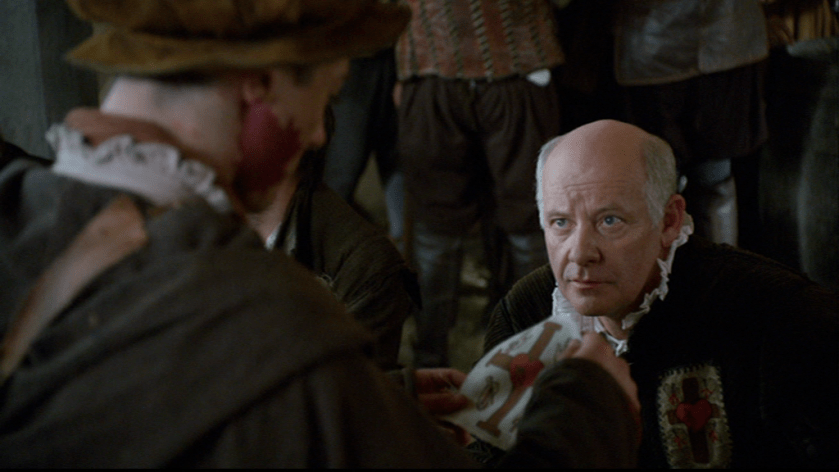
We follow our shepherd with a birthmark, Charlie Raw’s (Diarmuid Noyes) induction course, and find that the taking of oaths was a big part of the Pilgrimage. One used at the time in Lincolnshire was:
“Ye shall swear to be true to Almighty God, to Christ’s Catholic Church, to our Sovereign Lord the King, and unto the Commons of this realm, so help you God, and Holydam and by this book.”9
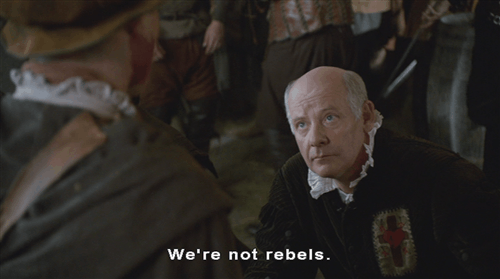
And there was nothing inherently wrong with those oaths for people of the period. The Church was the one you had known all your life, and it wasn’t asking you to rebel against the King…
Meanwhile, this is all inter cut with Cromwell’s elevation to the peerage as
King>Prince>Duke>Marquis>Earl>Viscount>Baron
…of Wimbledon. So, the lowest rung of Nobility, but he’s on there. He can’t be taunted with ‘commoner’ references anymore. Appropriately for Cromwell the style note for this court event was Black on black on black. Let’s see how everyone did.  It’s rich and deep with texture upon texture of black, even managing to make the gold accents feel a deeper, more sombre tone. Nice. That’s strong play from Henry.
It’s rich and deep with texture upon texture of black, even managing to make the gold accents feel a deeper, more sombre tone. Nice. That’s strong play from Henry.
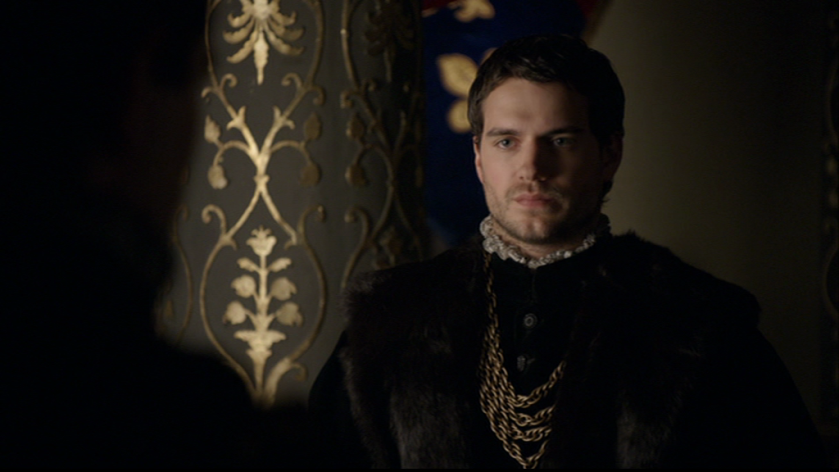 Weak shit from Brandon, who has clearly just thrown on the three darkest things in his wardrobe with an ill grace. The fur is fucking brown.
Weak shit from Brandon, who has clearly just thrown on the three darkest things in his wardrobe with an ill grace. The fur is fucking brown. 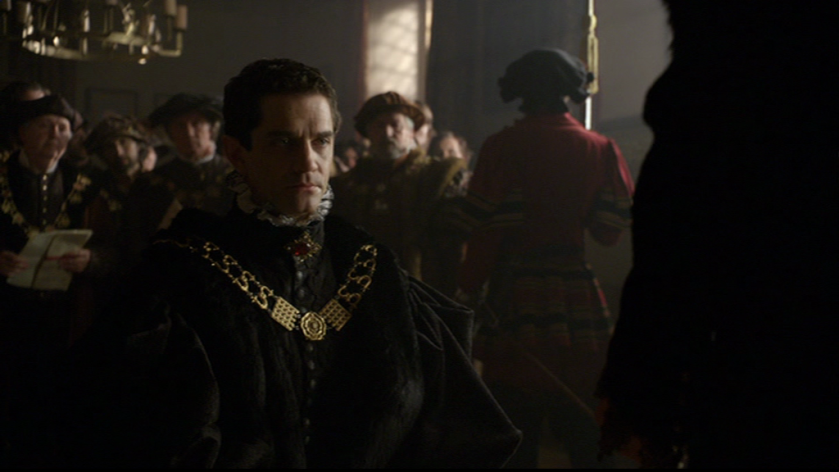 Oh God, that’s amazing. Your screen resolution might have to be incredibly high to get all the detail so, with what looks like heavy velvet draping on the side there, Cromwell must be about four feet wide and carrying many kilos of fabric. It’s beautiful. That chunky chain of office and massive ruby or garnet suddenly makes Henry’s ornamentation look fussy and delicate. His black fur is the neatest and sleekest. That final, lowest layer of black velvet has an embossed pattern in it (Before the existence of machining, that’s outrageous). That outfit is as pointedly understated as Grace Jones in an incredible T shirt at Cannes.
Oh God, that’s amazing. Your screen resolution might have to be incredibly high to get all the detail so, with what looks like heavy velvet draping on the side there, Cromwell must be about four feet wide and carrying many kilos of fabric. It’s beautiful. That chunky chain of office and massive ruby or garnet suddenly makes Henry’s ornamentation look fussy and delicate. His black fur is the neatest and sleekest. That final, lowest layer of black velvet has an embossed pattern in it (Before the existence of machining, that’s outrageous). That outfit is as pointedly understated as Grace Jones in an incredible T shirt at Cannes.
Cromwell’s getting what he really wants, too. He gets a personal honour (a knighthood) and becomes Lord Privy Seal, the title used by the King’s first minister in the period. So his hold on power is also being cemented publicly by Henry. That must be amazing news. Cromwell gets to sneer back at Brandon, and secure in royal favour and known by everyone to be so, he has his own cheat code for court life now. 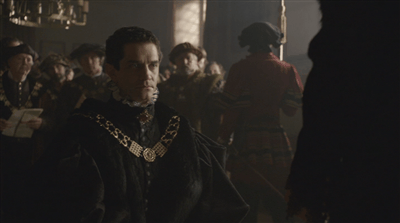
Cromwell’s elevation is being deliberately moved to get set against the beginning of Charlie Raw’s rebellion by The Tudors, because Charlie’s induction would have been mid to late October 1536, while Cromwell became Lord Privy Seal in July. 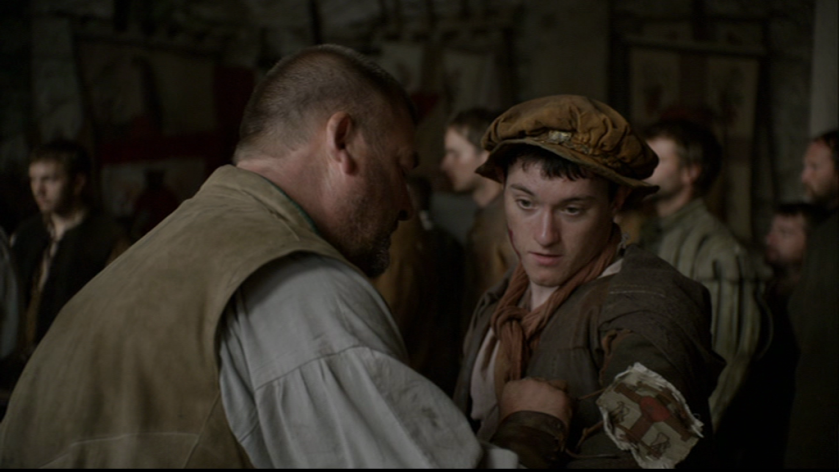
Henry Giveth
The visit from Henry and Jane to Mary after her capitulation is Actual Historical, as are the gifts mentioned (a large diamond from Jane, 1000 crowns from Henry) 10.
There are still ladies in waiting and others around but the scene depicting it is very intimate. Jane is warm, welcoming and dignified, while allowing Mary enough space to carry her own dignity. 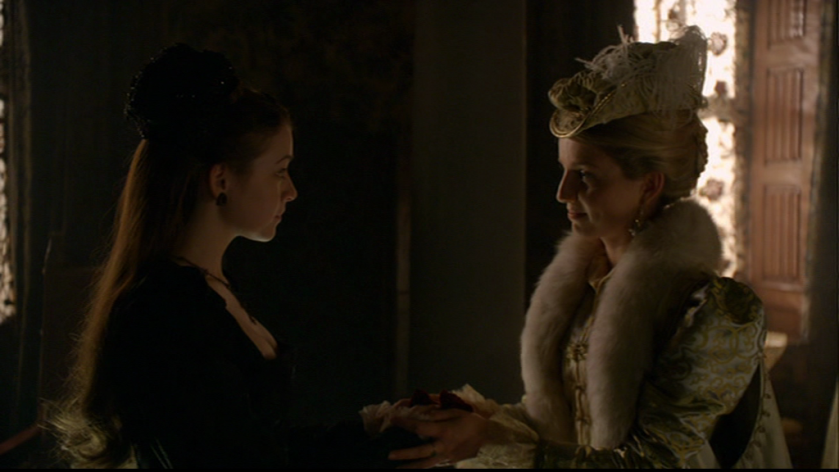 Henry’s approach is somewhat different. The greater formality in greeting a monarch, and the fact that he was sending her death threats by proxy a couple of weeks ago means Mary stays curtsied a long damn time. But that means that he has to come up and tell her she can rise, and that means that for the first time in a long, long time he really sees Mary. What he sees is a face with many similarities to his own, and no doubt to her mother’s, and he gets that emotional connection to Mary that he kept well away from for the duration of his relationship with Anne.
Henry’s approach is somewhat different. The greater formality in greeting a monarch, and the fact that he was sending her death threats by proxy a couple of weeks ago means Mary stays curtsied a long damn time. But that means that he has to come up and tell her she can rise, and that means that for the first time in a long, long time he really sees Mary. What he sees is a face with many similarities to his own, and no doubt to her mother’s, and he gets that emotional connection to Mary that he kept well away from for the duration of his relationship with Anne.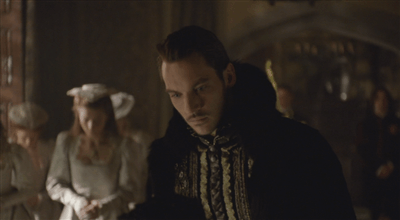 And so he gives her money. He also asks her to call him ‘father’, which is nice, and maybe we should just embrace the fact that he showed up without a death threat and they have some kind of relationship now, which, given the way he behaves, will probably afford her at least couple of extra castles and a couple of stress related illnesses by the time she’s 30 (She turned 20 in early 1536).
And so he gives her money. He also asks her to call him ‘father’, which is nice, and maybe we should just embrace the fact that he showed up without a death threat and they have some kind of relationship now, which, given the way he behaves, will probably afford her at least couple of extra castles and a couple of stress related illnesses by the time she’s 30 (She turned 20 in early 1536).
And Henry Taketh Away
Back at Whitehall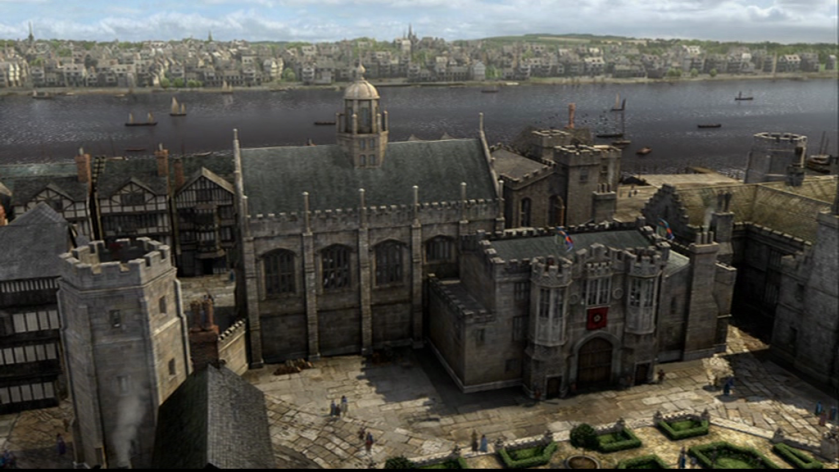
Jane and Henry are dining and Jane’s having real trouble getting him engaged in the conversation. 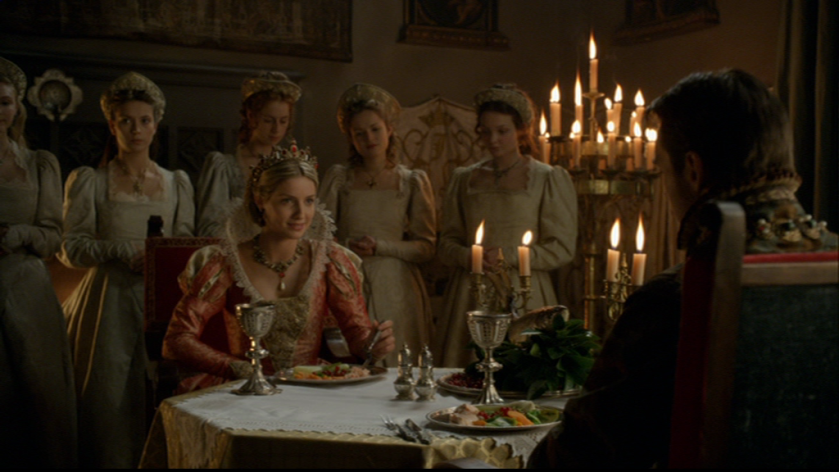 He doesn’t want to hear about what she thinks of Mary (she really likes and is impressed by her), and is eyeing up Ursula and grey rocking his wife like it’s mid to late Season 2. She can’t talk to him, efforts to change the subject are just annoying him so she takes a moment, considers her position, and then asks him why he will not speak (I quite agree with commenter Isidra, this Jane is a woman of very careful footfalls).
He doesn’t want to hear about what she thinks of Mary (she really likes and is impressed by her), and is eyeing up Ursula and grey rocking his wife like it’s mid to late Season 2. She can’t talk to him, efforts to change the subject are just annoying him so she takes a moment, considers her position, and then asks him why he will not speak (I quite agree with commenter Isidra, this Jane is a woman of very careful footfalls). 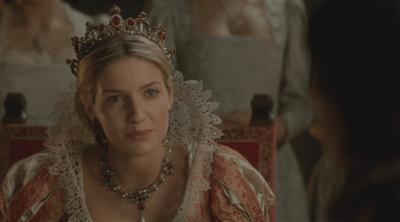 Oh, oh so we’re just right out and saying it, then. When asked why he’s being such a dick he basically points at her uterus and taps his watch. And we all remember what the last Queen really died of, right?
Oh, oh so we’re just right out and saying it, then. When asked why he’s being such a dick he basically points at her uterus and taps his watch. And we all remember what the last Queen really died of, right?
It’s not supporting his behaviour but the timing of this sudden resentment might explain at least how he got there. Mary wouldn’t be such a threat if he had a son, and so maybe somewhere along the line in Henry’s mind he gets to pin the blame for his recent behaviour towards Mary on Jane’s failure to conceive.
And Jane just kind of has to deal with it. Fortunately a massive distraction is headed southward at the speed of horse.
Each great man bids the Sellsword kill the other two
If power is having none of your minions whisper about your reaction to very bad news, then Thomas Cromwell was a very powerful man. I love the reaction he is given in The Tudors. There’s no dodging, no denial of patent reality which so often and tediously accompanies pants-wettingly bad news to see here. Cromwell is straight to “Here is a massive problem, lets figure out the scope and then start dealing with the problem”.
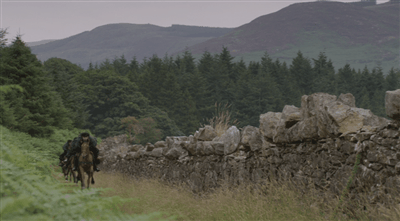
The bearers of horrifying news then describe some of the deaths that have occurred already. The names are changed, but the two deaths The Tudors chooses to highlight were real. The man killed by being beaten to death with staves was John Rayne11, the one hanged was a Mr Thomas12 or George13 Wolsey. So, easy to see why that confusing name never made The Tudors’ edit. There were far worse rumours that went around, that Nicholas Bellow was blinded and sewn up in cowhide to be killed by having dogs set on him, which didn’t actually happen at all 14.
Cromwell gets a pretty succinct recap of the rebel demands.
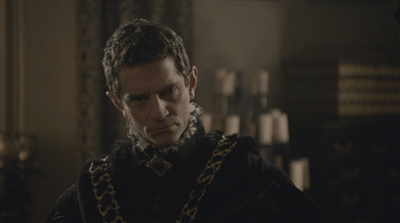
There’s a brief discussion about scale (this isn’t something that can be controlled locally, there are whole armies moving about, right now) and Cromwell decides that, as bad as its likely to be for him, Henry needs to know this now. So we cut to Henry.
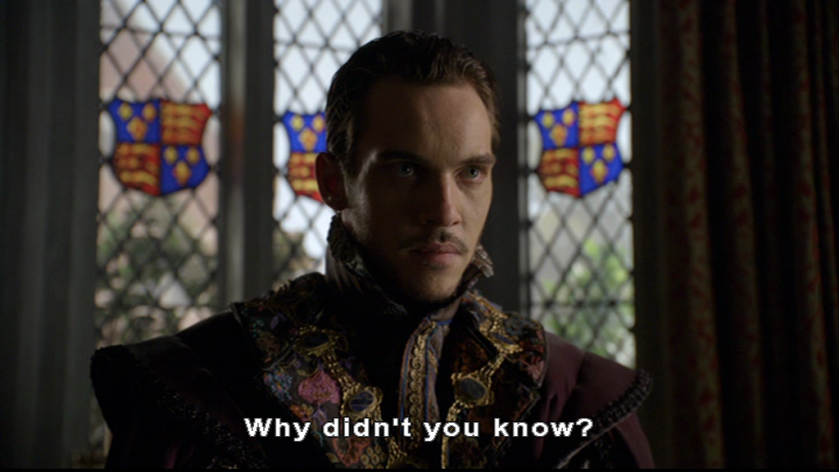
The trouble with encouraging only ‘blue skies, sunny weather’ reporting is that storms come as a bit of a surprise for you. The plus side of this approach is that you still get to blame whoever is below you for not telling you there’s been a damn storm coming. It is still technically their job even if, technically, you have been heavily penalising bad weather reports, and offering bonuses for good weather reports for over a year now.
And I think part of our Henry knows that because his reaction is still relatively restrained, well that and Cromwell’s complete and utter submission has to help. I mean, he’s angry, Cromwell gets a slap and a lecture and to sit down and take dictation in front of Henry in a power pose. I think we can also congratulate Cromwell for not ‘doing a Wolsey’ and trying to relentlessly spin what has been a very bad miscalculation for him.
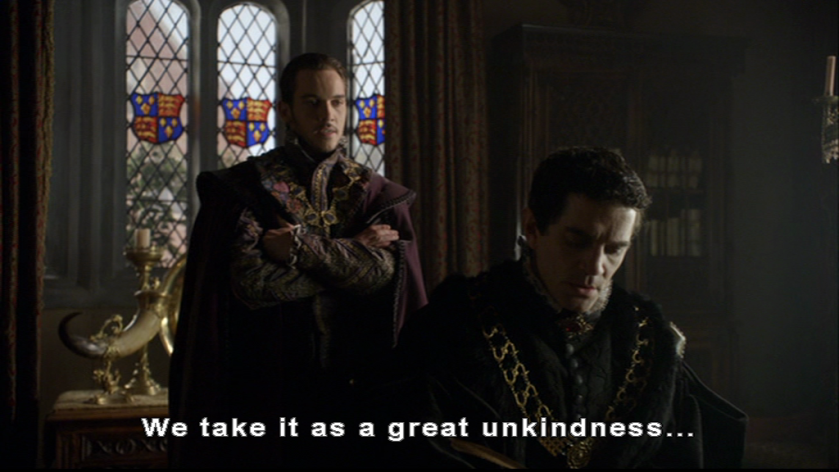
Henry’s letter is kind of right. It’s not the original or a direct recreation, but the themes and tone are right and it does take some things direct from history – those last couple of lines are taken right from Henry’s letter at the time of the Lincolnshire rising15.
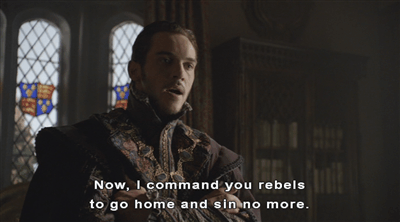
We cut to the actual rising, and the score comes in again with martial intent as John Constable, accompanied by Aske, gives stirring marching orders to an impressively sized commons host. 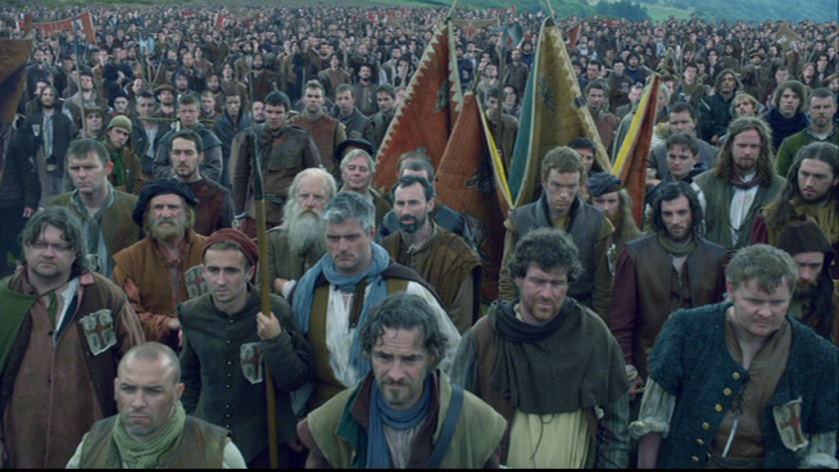
This scene ends on four repeated, jabbed notes in the score as we take in just how big that army could be.
Cromwell and Rich have a brief discussion about perhaps moderating their approach, but Cromwell insists it’s not going to work, and at this point he’s probably right. His ‘can do, don’t blame the messenger, get good information’ attitude has taken quite a lot of wear today, when one of the gentlemen from earlier returns, to tell them that the rebels have taken Lincoln.
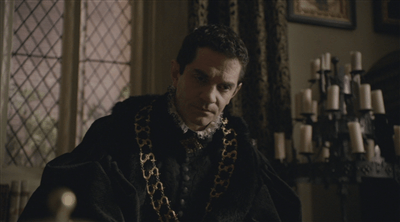
Who Lives, Who Dies?
Henry was a truly dreadful human being. He wasn’t much cop in the job he really needed to be good at, Renaissance Monarch, either. He let the personal get political when it wasn’t helping and he didn’t need to, and his contemporaries often outplayed him, Francis I frequently managing it on far worse cards. He made some decent decisions (nice Navy, thanks, going to come in hugely useful next half millenium) but as a Renaissance Monarch his legacy is hopelessly outshone by Elizabeth who had to fix or at least to stabilise the issues with Henry’s legacy, before building her own in far worse circumstances but to far greater effect. Like Charles HRE, she was really good at being a Renaissance Monarch.
But Medieval Monarch, where the first law is ‘survive’, and it’s probably still ‘survive’ down to around law number seven, where your brother might just be your assassin, well that was a job Henry VIII could really do. He could smile and laugh and ‘Hail good fellow’ you right up until you felt the irons close around your wrist, and he got better at it as he aged. That’s how so many never saw him coming.
A Medieval Monarch lived with fear a lot, could be propelled by it. And the monologue below is one of the reasons that I don’t bitch about Rhys Meyer’s performance to perhaps the level I sometimes should.
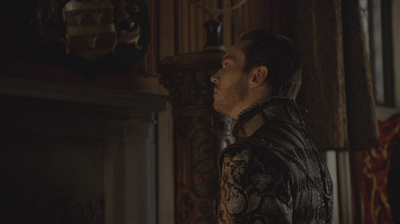
When she was young Henry’s mother, Elizabeth of York, would have seen her own brother, Richard, get taken from the sanctuary at Westminster, and she never saw him again.
For a Medieval Monarch, rebellions were great ways to either die direct, or lose power then die. Illustrating the reality of that fear with the idea that Elizabeth of York could not hide how afraid she was to her precocious young son while she was back in hiding during the Cornish rebellion of 1497 (Dave Does History is kind of big on Henry VII, there’s a good essay about that rebellion here) was a kind of amazing leap. This scene was a great creation, thick with historical context and meaning, beautifully delivered, and goes straight to explaining a lot of that visceral fear and what we’ll see it have Henry do in the next few weeks.
My only concern at the end of it (partly caused by hindsight in the next scene) is that Henry is talking in ‘Kill them All’ and all Brandon is hearing is ‘Cromwell is in trouble’. Once Brandon has explained to his wife (who is kind of stealing the scene with her ‘long suffering but practical military wife’ energy) what he reckons is happening (He doesn’t have much of an idea, honestly) we return to Henry, who is disturbed while working by what looks to be pain.
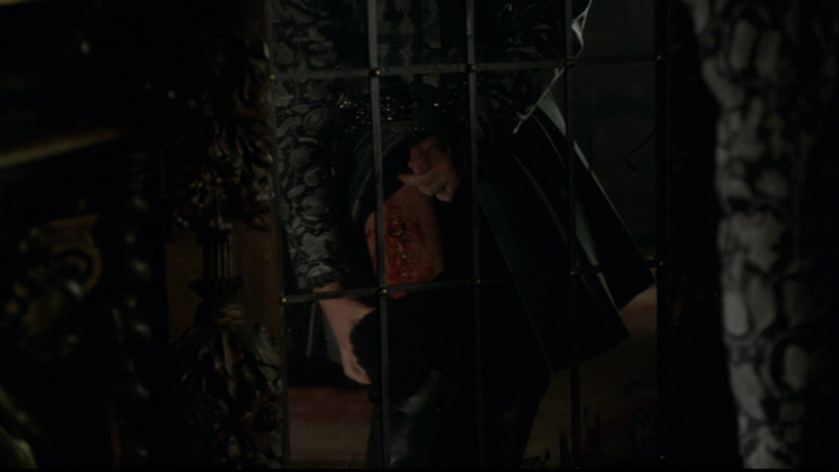
That leg injury has flared up again, to the point where it looks like chutney. We see him press it to try and relieve the pressure and the agony that causes him, and how he has to rapidly compose himself when Cromwell walks in. In time of crisis, the body of the King better damn well be fine, no matter the cost to the body. 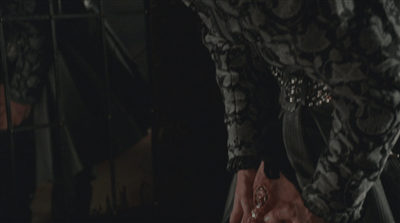 The tension of that, and the pain he’s clearly in, probably affect the vengeance rant Henry goes on now. It culminates with him promising massive wide scale and personal destruction if the North does not submit and a personal threat for Cromwell.
The tension of that, and the pain he’s clearly in, probably affect the vengeance rant Henry goes on now. It culminates with him promising massive wide scale and personal destruction if the North does not submit and a personal threat for Cromwell.
But as we leave the episode we get a glimpse of the state of the Northern rising, 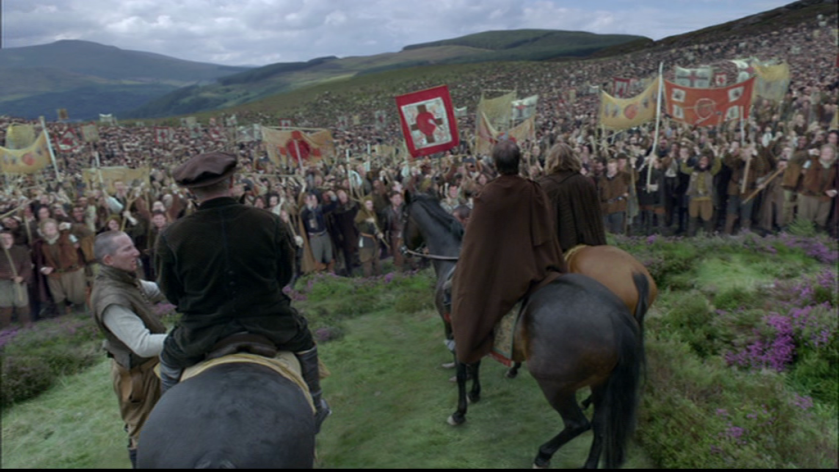
and Henry’s going to need a bigger army.
Notes
Had a wash and brush up edit. 19/02/2020
Been checking back for these even though I finished the Tudors a few weeks after discovering your site. Never thought of the transition from medieval to renaissance monarch. I wonder if we’re seeing a reversion to the medieval type in the 20th/21st century though, as much of what royal families do is triangulated keeping republican sentiment in mind. Is it just the same “survive 7 times over” in a nonviolent form?
LikeLiked by 1 person
Hi, I just wanted to say Thank you for your comment. This one in particular got me thinking about families, and Medieval/Renaissance transition of monarchy, and then I read about Thomas Miller, and remembered what Elizabeth did, all over about 2 days and then I had my ending to the Pilgrimage of Grace. It was your comment that started me on it, and I just posted S3 E4 (1) where I round it off, so thanks for the inspiration.
LikeLike
Thanks for the link to my blog. Nothing like a good Tudor rebellion!
LikeLiked by 1 person
Yeah, they do get hold of you, don’t they? Only trouble is the endings are brutal.
LikeLike
is this a new person doing these?
LikeLiked by 1 person
Oh look, I’m slightly less delighted. No, Amy, it’s still me, and give me a second to grab what may or may not be alcohol, swirl it about a bit, lean back in what I’m hoping is my most intimidating manner, get my eyebrow properly positioned and ask if there is any context for that thought you’d care to share?
LikeLike
Nothing? Well alright Amy M, fair enough. I am, while a little defensive, also pretty curious for how I went from being a ‘jewel’ to “Is this a new person doing these?” from the end of Season 2 to the beginning of Season 3 in your estimation.
Also, forgive me for answering directly, but I was really the only person that could answer that question.
I’m pretty confident in the work I did on Season 3, proud of it, and secure enough that if you found stuff that was jarring, or found the style change abrupt, or even if it’s “There’s a twenty minute quite dull history lesson jammed there and it just seemed like a totally different voice to me” then I’m curious to know what it is.
I mean, I’m almost certainly going to disagree with some/most/all of it, but it’s all a reader’s experience, all valid and potentially useful feedback, and I like to think that I’m a reasonable human being.
We could find out if that’s true. Let me know your thoughts, Amy M, for my drink swirled onto the carpet, my eyebrow cramped up and I dozed off in that comfy chair some time ago. I think it would go fine.
LikeLike
HI! I just found your blog as I’ve been re-watching this series. I’m grateful that you are pointing out historical fact, as well as, historical fiction. Thank you for this! It puts the entire series in to a better perspective for me.
LikeLiked by 1 person
Loved that Lord Varys reference there, that riddle from A clash of kings is one of my favorite quotes about medieval power, about power in general. Very appropiate for the rebellion and how the crown dealt with the situation, and a fitting one for Cromwell’s arc. First 4 seasons of GOT were great.
I say again, I’m gonna miss these so much when it’s over
LikeLiked by 1 person